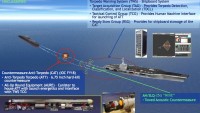Destroying China’s Militarized Islands will take about 15 Minutes, says Former US Spy Chief
| Arthur Dominic Villasanta | | Oct 03, 2016 09:41 PM EDT |
(Photo : US Navy) Warships of the United States Seventh Fleet.
China's man-made, militarized islands spread out over the South China Sea are totally indefensible and death traps for their troops, and a top United States spy has confirmed this fact.
Dennis C. Blair, who was the United States' Director of National Intelligence (DNI) from 2009 to 2010, believes the U.S. and China are locked into opposing positions that make it almost impossible to reach a compromise.
Like Us on Facebook
"I think there's a notable inability for the two of us to understand what's going on, on the other side and to find compromises we can both live with," said Blair.
Blair pointed out China's claim to own the South China Sea despite a ruling by the Permanent Court of Arbitration to the contrary is "intolerable" for the U.S. This impasse has created a situation where neither side can be seen to be backing down. And this might trigger a war.
"We seem to have to deal by a series of concessions or wins, and that's the kind of relationship that can escalate up over time," he said.
The prevailing situation could "lead to conflict. Misunderstanding, then fear and conflict."
Blair is also a retired U.S. Navy Admiral who was formerly Commander, United States Pacific Command (USPACOM) from 1999 to 2002, and has the experience and expertise to analyze the military situation in the South China Sea.
USPACOM is responsible for U.S. Navy operations in the Indo-Asia-Pacific region in the event of war. It commands the United States Seventh Fleet, the largest of the forward-deployed U.S. fleets, with 60 to 70 ships, 300 aircraft and 40,000 Navy and Marine Corps personnel.
Blair is confident the U.S. will quickly and easily defeat China in any conflict.
His optimism might be anchored on the realities the U.S. Navy can bring to bear enormous firepower against any fleet of the three fleets of the People's Liberation Army Navy (PLAN), which operates no combat-capable carrier. PLAN has classified its only carrier, the Liaoning, a training carrier unsuitable for combat.
China's much advertised DF-21 anti ship ballistic missile is also under development and its immature kill chain might prevent it from even acquiring fast moving U.S. Navy carrier strike groups hundreds of kilometers distant. Chinese submarines, while a threat, aren't a serious enough threat to curtail operations of U.S. Navy ships.
But if a conflict were to occur, this will likely be triggered by China.
If there should be war, Blair is confident the U.S. Navy and the U.S. Air Force are capable of rapidly "neutralizing" China's outposts in the South China Sea, which are practically defenseless from a determined attack being isolated and strung out over hundreds of kilometers of sea.
These offensive operations by the Navy and Air Force will only take "probably 10 or 15 minutes' worth of worth of work for U.S. forces."
Based on past campaigns such as those against ISIL in Iraq and Libya, the U.S. Navy will likely use waves of Tomahawk Land Attack Cruise Missiles fired from Los Angeles-class attack submarines and Arleigh Burke-class guided missile destroyers to bombard the militarized Chinese-held islands in the South China Sea.
The Tomahawks can be launched up to 1,700 km from their targets while GPS and inertial navigation systems ensure their 450 kg warheads hit with great accuracy. Since all the Chinese military installations are above ground, a rain of Tomahawks with air burst, high fragmentation or unitary warheads will destroy all above ground structures and the troops manning them.
Priority targets for the Tomahawks will be the Chinese HQ-9 surface-air-missile batteries such as those emplaced on Woody Island in the Paracel Islands China controls. Hardened hangars for People's Liberation Army Air Force jets such as the Shenyang J-11 on Woody Island will also be attacked, along with whatever aircraft are on this island.
An invasion by U.S. Marines can be expected on the larger Chinese islands.
TagsDennis C. Blair, South China Sea, militarized islands, Director of National Intelligence, U.S. Navy, Permanent Court of Arbitration, United States Seventh Fleet, People's Liberation Army Navy
©2015 Chinatopix All rights reserved. Do not reproduce without permission
EDITOR'S PICKS
-

Did the Trump administration just announce plans for a trade war with ‘hostile’ China and Russia?
-

US Senate passes Taiwan travel bill slammed by China
-

As Yan Sihong’s family grieves, here are other Chinese students who went missing abroad. Some have never been found
-

Beijing blasts Western critics who ‘smear China’ with the term sharp power
-

China Envoy Seeks to Defuse Tensions With U.S. as a Trade War Brews
-

Singapore's Deputy PM Provides Bitcoin Vote of Confidence Amid China's Blanket Bans
-

China warns investors over risks in overseas virtual currency trading
-

Chinese government most trustworthy: survey
-

Kashima Antlers On Course For Back-To-Back Titles
MOST POPULAR
LATEST NEWS
Zhou Yongkang: China's Former Security Chief Sentenced to Life in Prison

China's former Chief of the Ministry of Public Security, Zhou Yongkang, has been given a life sentence after he was found guilty of abusing his office, bribery and deliberately ... Full Article
TRENDING STORY

China Pork Prices Expected to Stabilize As The Supplies Recover

Elephone P9000 Smartphone is now on Sale on Amazon India

There's a Big Chance Cliffhangers Won't Still Be Resolved When Grey's Anatomy Season 13 Returns

Supreme Court Ruled on Samsung vs Apple Dispute for Patent Infringement

Microsoft Surface Pro 5 Rumors and Release Date: What is the Latest?














